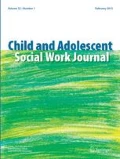Abstract
How do youth in foster care experience non-death loss? Drawing upon the theories of ambiguous loss, symbolic loss, and disenfranchised grief, this applied theoretical article integrates research findings to address how youth experience loss, grief, and trauma in foster care. Youth’s reports illustrate experiences of non-death loss, the impact of non-death loss on psychological and emotional well-being, and how non-death losses are disenfranchised and enfranchised within the foster care system. Recommendations are made that child welfare agencies consider how their practices and policies can be enhanced to meet the needs of grieving youth in foster care.
Similar content being viewed by others
References
Ahrens, K. R., Garrison, M. M., & Courtney, M. E. (2014). Health outcomes in young adults from foster care and economically diverse backgrounds. Pediatrics, 134(6), 1067–1074.
Blakey, J. M., Leathers, S. J., Lawler, M., Washington, T., Natschke, C., Strand, T., et al. (2012). A review of how states are addressing placement stability. Children and Youth Services Review, 34, 369–378. doi:10.1016/j.childyouth.2011.11.007.
Boss, P. (1999). Ambiguous loss. Learning to live with unresolved grief. Cambridge, MA: Harvard University Press.
Boss, P. (2006). Loss, trauma, and resilience: Therapeutic work with ambiguous loss. New York: W.W. Norton & Company, Inc.
Doka, K. J. (Ed.), (1989). Disenfranchised grief: Recognizing hidden sorrow. Lexington, MA: Lexington Books.
Doka, K. J. (2002). Introduction. In Disenfranchised grief: New directions, challenges, and strategies (pp. 5–22). Champaign, IL: Research Press.
Granting. (2016). In A Little Hope: The national foundation for grieving children. Retrieved December 20, 2016, from http://www.alittlehope.org/granting.
Grief Reach Grant Opportunities. (2016). In National Alliance for Grieving Children. Retrieved December 20, 2016, from https://childrengrieve.org/2016-grief-reach-grant-opportunities.
Herrick, M. A., & Piccus, W. (2005). Sibling connections: The importance of nurturing sibling bonds in the foster care system. Children and Youth Services Review, 27(7), 845–861. doi:10.1016/j.childyouth.2004.12.013.
Hooyman, N. R., & Kramer, B. J. (2006). Living through loss: Interventions across the lifespan. New York, NY: Columbia University Press.
Horner, T. M., & Gale, J. B. (2010). Children in foster care. In E. B. Benedek, P. Ash & C. L. Scott (Eds.), Principles and practice of child and adolescent forensic mental health (pp. 171–182). Arlington, VA: American Psychiatric Publishing, Inc.
Johnson, K. (2004). Grief in North America, a death-denying society. International Journal of Palliative Nursing, 10, 435. doi:10.12968/ijpn.2004.10.9.16048.
Kools, S. M. (1997). Adolescent identity development in foster care. Family Relations, 46, 263–271. doi:10.2307/585124.
Leathers, S. J. (2003). Parental visiting, conflicting allegiances, emotional and behavioral problems among foster children. Family Relations, 52(1), 53–63. doi:10.1111/j.1741-3729.2003.00053.x.
Leathers, S. J. (2006). Placement disruption and negative placement outcomes among adolescents in long term foster care: The role of behavior problems. Child Abuse and Neglect, 30(3), 307–324. 10.1016/j.chiabu.2005.09.003.
Lee, R., & Whiting, J. (2007). Foster children’s expressions of ambiguous loss. The American Journal of Family Therapy, 35(5), 417–428.
Mitchell, M. B. (2016a). The neglected transition: Building a relational home for children entering foster care. New York: Oxford University Press.
Mitchell, M. B. (2016b). The family dance: Ambiguous loss, meaning-making, and the psychological family in foster care. Journal of Family Theory and Review, 8, 360–372. doi:10.1111/jftr.12151.
Mitchell, M. B., Jones, T., & Renema, S. (2015). Will I make it on my own? Voices and visions of 17-year-old youth in transition. Child and Adolescent Social Work Journal, 32, 291–300.
Mitchell, M. B., & Kuczynski, L. (2010). Does anyone know what is going on? Examining children’s lived experience of the transition into foster care. Children and Youth Services Review, 32, 437–444.
Mitchell, M. B. & Vann, L. H. (2016). Staying connected with youth in transition: “Thank you for not giving up on me”. Journal of Social Work, doi:10.1177/1468017316654342.
Rando, T. (1984). Grief, dying, and death: Clinical interventions for caregivers. Champaign, IL: Research Press.
Reynolds, J. J. (2002). Disenfranchised grief and the politics of helping: Social policy and its clinical implications. In K. J. Doka (Ed.), Disenfranchised grief: New directions, challenges, and strategies for practice (pp. 351–388). Champaign, IL: Research Press.
Roller White, C., O’Brien, K., Pecora, P. J., & Buher, A. (2015). Mental health and educational outcomes for youth transitioning from foster care in Michigan. Families in Society: The Journal of Contemporary Social Services, 96, 17–24.
Schuurman, D. (2003). Never the same: Coming to terms with the death of a parent. New York: St. Martin’s Press.
Unrau, Y. A., Seita, J. R., & Putney, K. S. (2008). Former foster youth remember multiple placement moves: A journey of loss and hope. Children and Youth Services Review, 30, 1256–1266.
US Department of Health and Human Services, Administration for Children and Families, Children’s Bureau. (2016). The AFCARS report No. 23: Preliminary FY 2015 estimates as of June 2016. Retrieved , from https://www.acf.hhs.gov/sites/default/files/cb/afcarsreport23.pdf.
Walsh, K. (2012). Grief and loss: Theories and skills for the helping professions (Rev.ed.). New York: Pearson.
Wolfelt, A. (1983). Helping children cope with grief. New York: Routledge.
Acknowledgements
My sincere gratitude to the youth participants, the research team, the funding agencies, and the article reviewers.
Funding
The article is based on research funded by the South Carolina Department of Social Services and the John Templeton Foundation, through the Enhancing Life Project administered by the University of Chicago. The views expressed in this publication are those of the author and not necessarily those of the South Carolina Department of Social Services, the John Templeton Foundation, the Enhancing Life Project, or the University of Chicago.
Author information
Authors and Affiliations
Corresponding author
Rights and permissions
About this article
Cite this article
Mitchell, M.B. “No One Acknowledged My Loss and Hurt”: Non-death Loss, Grief, and Trauma in Foster Care. Child Adolesc Soc Work J 35, 1–9 (2018). https://doi.org/10.1007/s10560-017-0502-8
Published:
Issue Date:
DOI: https://doi.org/10.1007/s10560-017-0502-8




